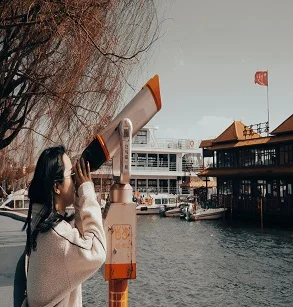Are you interested in Travel and Tourism? Then this is the perfect course for you. Learn how to manage Travel professionally!
620 Hours Duration
Completion Certificate
No Entry Requirements
Endorsed Courses
Get Your Course Now
Only 1 Day Left at this price
Discount 80% £1,100.00


Course Overview
Level 7 Diploma in Travel and Tourism Management
Study online with CPD Courses, for the chance to enrich your CV with a Level 7 Diploma in Travel and Tourism Management. Discover the difference an endorsed Level 7 Executive Diploma in Travel and Tourism could make to your career prospects, with the freedom to study at a time and pace to suit your lifestyle.
The global tourism industry is the single largest sector in the world, worth an approximate annual economic contribution of more than $7.6 trillion. Incredibly, it’s estimated that one in every 10 jobs is supported directly by the travel and tourism industry. An immensely diverse and dynamic employer with limitless career opportunities to explore, the travel and tourism sector welcomes outgoing and ambitious candidates from all backgrounds. From human resources to marketing to customer service to logistics, there’s no shortage of job options available. It’s simply a case of getting your career off to the best possible start, which is precisely where this Level 7 Executive Diploma in Travel and Tourism could make all the difference!
Open to newcomers and experienced members of the workforce, this advanced program takes an in-depth look at the functions and objectives of the travel and tourism sector. Over the course of 18 engaging modules, key topics covered include tourism products and services, managing tour operations, sales and marketing in the tourism sector, customer relationship management, human resource management, transport management, crisis management and the importance of sustainable tourism. Each module concludes with an online assessment and expert tutor support is available on demand throughout.
Sign up online and get started today, or contact the admissions team at CPD Courses for more information.
Who Should Take This Course
- Newcomers looking to break into the tourism sector
- Members of the workforce pursuing promotion
- Outgoing and enthusiastic candidates who love to travel
- Tourism business owners, managers, team leaders etc.
- Anyone interested in starting their own tourism business
- Jobseekers working on their employment prospects
Course Syllabus
This course consists of the following units:
Module 1 – Introduction to the Global Travel & Tourism Industry
This module provides an overview of the global tourism industry, explaining key sectors, trends, and how travel businesses operate in international markets.
Module 2 – Travel Products, Services & Smart Tourism Systems
Learners explore various travel products and services, while studying smart tourism technologies that enhance efficiency and customer experience.
Module 3 – Tour Operations & Digital Distribution Channels
This module covers the role of tour operators and teaches how digital platforms, booking systems, and distribution channels support modern tourism.
Module 4 – Marketing and Sales in the Travel Industry
Learners gain knowledge of tourism marketing strategies and sales techniques, learning how to promote travel products and attract global customers.
Module 5 – Customer Experience and Relationship Management
This module focuses on delivering memorable customer experiences and developing strong client relationships to improve loyalty and satisfaction.
Module 6 – Risk, Crisis, and Reputation Management in Tourism
Learners study how to manage risks and crises in tourism, along with strategies for protecting and restoring an organisation’s public reputation.
Module 7 – Human Resources and Organisational Skills in Tourism
This module teaches essential HR skills, including recruitment, training, leadership, and workplace organisation within tourism businesses.
Module 8 – Sustainable and Responsible Tourism Management
Learners explore sustainability principles and responsible tourism practices, gaining skills to promote ethical, eco-friendly tourism development.
Career Path
A career in travel and tourism can literally take you places you never dreamed possible. Whether pursuing a high-flying position with an established tour operator or looking to set up your own agency from scratch, an endorsed Level 7 Diploma on your CV could make all the difference. Typical job titles in the field of travel and tourism include Holiday Representative, Tour Guide, Travel Agent, Concierge Manager, Marketing Director, Sales Representative and many more besides. All with limitless scope for advancement, both at home and on an international basis.
Endorsement
At the end of this course successful learners will receive a Certificate of Achievement from the Quality Licence Scheme and a Learner Unit Summary (which lists the components the learner has completed as part of the course).
This course and/or training programme has been endorsed by the Quality Licence Scheme for its high-quality, non-regulated provision and training programmes. This course and/or training programme is not regulated by Ofqual and is not an accredited qualification. Your training provider will be able to advise you on any further recognition, for example progression routes into further and/or higher education. For further information please visit the Learner FAQs on the Quality Licence Scheme website.
FAQs
What is sleep tourism?
Sleep tourism refers to travel experiences designed specifically to promote rest and better sleep, often featuring luxurious bedding, sleep-inducing environments, and wellness therapies focused on relaxation.
What is solo travel?
Solo travel is when an individual explores destinations independently without a travel companion. It offers freedom, self-discovery, and a unique opportunity to connect with new people and cultures.
Who is a famous traveling person?
One of the most famous modern travelers is Rick Steves, an American travel writer and TV host known for his travel guides and shows focused on European destinations.
What is the best travel quote?
A popular travel quote is: "The world is a book and those who do not travel read only one page." – Saint Augustine.
What defines travel?
Travel involves the movement of people from one location to another for leisure, business, or exploration. It can be local or international and includes a wide range of experiences and purposes.
Does this course cover sustainable tourism in detail?
Yes, sustainable tourism is a key component, focusing on responsible travel practices, environmental preservation, and the role of communities in tourism development.
Will I learn how to manage crises in tourism settings?
Absolutely. The course includes a dedicated module on crisis management, providing tools to prepare for, handle, and recover from emergencies in the tourism sector.
Are there modules focused on sales techniques?
Yes, there are multiple modules that explore sales strategies, including telemarketing, communication skills, and smart selling techniques tailored for tourism professionals.
Is human resource management included in this course?
Yes, the course features a comprehensive module on managing human resources within the tourism industry, emphasizing staff development, motivation, and HR strategy.
Do I need a background in travel and tourism to enroll?
No prior experience is required. The course is designed to support learners at all levels, including those new to the field, with step-by-step guidance through all core concepts.


Your Certificate, Delivered Instantly & Professionally
Finish your course and instantly download your PDF certificate to share or showcase. Prefer a hard copy? We’ll send you a beautifully printed version, ready to frame and display with pride!
Recognised CPD Certification
Earn a fully accredited CPD certificate that’s respected across industries.
Instant Download & Print
Download your certificate immediately after completing your course – perfect for your records or CV.
Printed Copy Included
You’ll also receive a professionally printed certificate delivered straight to your door – ideal for framing and display.

Verifiable Unique ID
Each certificate includes a unique ID number, easily verifiable by employers.
High-Quality Print
Enjoy a professionally printed certificate that looks impressive and feels premium.
Completion dates included
Your certificate clearly displays the completion date, making renewal planning simple.
What our Students say
Celebrating our Clients and Partners





























